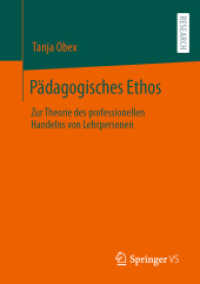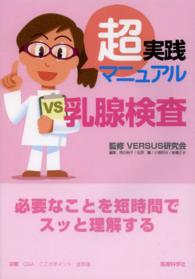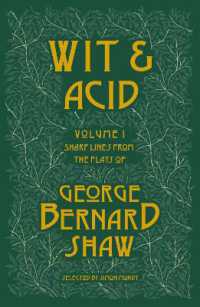- ホーム
- > 洋書
- > 英文書
- > Literary Criticism
Full Description
Reading 1759 investigates the literary culture of a remarkable year in British and French history, writing, and ideas. Familiar to many as the British "year of victories" during the Seven Years' War, 1759 was also an important year in the histories of fiction, philosophy, ethics, and aesthetics. Reading 1759 is the first book to examine together the range of works written and published during this crucial year. Offering broad coverage of the year's work in writing, these essays examine key works by Johnson, Voltaire, Sterne, Adam Smith, Edward Young, Sarah Fielding, and Christopher Smart, along with such group projects as the Encyclopédie and the literary review journals of the mid-eighteenth century. Organized around a cluster of key topics, the volume reflects the concerns most important to writers themselves in 1759. This was a year of the new and the modern, as writers addressed current issues of empire and ethical conduct, forged new forms of creative expression, and grappled with the nature of originality itself. Texts written and published in 1759 confronted the history of Western colonialism, the problem of prostitution in a civilized society, and the limitations of linguistic expression. Philosophical issues were also important in 1759, not least the thorny question of causation; while, in France, state censorship challenged the Encyclopédie, the central Enlightenment project. Taking into its purview such texts and intellectual developments, Reading 1759 puts the literary culture of this singular, and singularly important, year on the scholarly map. In the process, the volume also provides a self-reflective contribution to the growing body of "annualized" studies that focus on the literary output of specific years.
Contents
Contents
Acknowledgements
Introduction by Shaun Regan
I. Writing Empire
1. "What mankind has lost and gained": Johnson, Rasselas, and Colonialism by James Watt
2.. Voltaire's Candide as a Global Text: War, Slavery, and Leadership by Simon Davies
II. Sentimental Ethics, Luxurious Sexualities
3. Adam Smith's The Theory of Moral Sentiments in 1759: Spectatorship, Duty, and Social Improvement by Nigel Wood
4. "On the soft beds of luxury most kingdoms have expired": 1759 and the Lives of Prostitutes by Mary Peace
III. Authorship and Aesthetics
5. Young, Goldsmith, Johnson, and the Idea of the Author in 1759 by Adam Rounce
6. Towards a New Language: Sublime Aesthetics in Smart's Jubilate Agno by Rosalind Powell
IV. Enlightenment and its Discontents
7. The Encyclopédie in 1759: Crisis and Continuation by Rebecca Ford
8. Lost Cause: Hume, Causation, and Rasselas by James Ward
V. Originality and Appropriation
9. Eccentricity, Originality, and the Novel: Tristram Shandy, volumes 1 and 2 by Moyra Haslett
10. Shakespeare's "Propriety" and the Mid-Eighteenth-Century Novel: Sarah Fielding's The History of the Countess of Dellwyn by Kate Rumbold
VI. Conclusion: Reading 1759
11. Writers, Reviewers, and the Culture of Reading by Shaun Regan
Bibliography
About the Contributors







